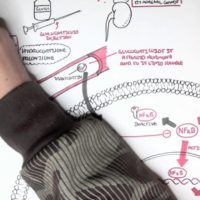Term 2 in St. George’s University consists of Neuroscience, Genetics/Immunology and Physiology. The Genetics and Immunology, are combined courses, with pre-midterm being all genetics and post midterm being all Immunology. For my cohort, we had a schedule hiccup, and had a portion of Immunology pre-midterm, that was included in our midterm examination, and post midterm was also mixed with some genetics, but majority immunology.
In this post, as I did with the Surviving Term 1, I am going to provide some information on how I survived term 2. Now the information in this, isn’t an end all solution, to survive term 2 at SGU, but my own personal experience and hindsight on Term 2.
First of all, get as much points from CPM and bioethics, as you can! You can actually get 100% in CPM and do very well in bioethics, those points matter a lot at the end of term 2! Those points can make or break you. Those are points that will determine if you move onto term 3, or not. So do not take those courses too lightly! Also, I would try to do very well on the unifieds (which is possible), because yet again, points matter in term 2, they can make or break you. Doing well in the unified exams, gives you leverage when it comes to the amount of points you will need per exam, to move from term 2 to term 3.
Now, as for term 2, you have to completely switch your way of thinking from term 1 to term 2. Application is the new concept from here forth, as it’s basically how we are going to diagnose patients and come up with appropriate treatment plans, as future doctors. The switch sometimes can be difficult because after spending so much time with one idea of studying, we now have to literally become “doctors”, overnight.
Genetics/Immunology
I am going to start with the histology of term 2; Genetics/Immunology. This is going to be the class that tends to be put on the back burner like histology was, but it isn’t going to be as easy as histology, rather it’s more like biochemistry. If you want to do very well on Genetics, you will need to memorize the crap out of your notes. The same way that I studied for biochemistry, is the same way I studied for Genetics. I would suggest doing all the Sakai quizzes provided to you and if they provide an Examsoft quiz, to do those also. As for immunology, this is another memorization class, because it will be all about diseases, cytokines, etc. If you could get your hands on the essentials notes that other terms had, that was supplemented to the lecture notes, those would be awesome to help you go through to the process of understanding Immunology. I used it as a supplementation to the current notes that were presented by the professor, while I was doing term 2. It helped immensely and all I did was include whatever extra information he provided, that wasn’t in those essential notes.
Neuroscience
Now onto Neuroscience, which a lot of people describe as one of the hardest classes in term 2. I will have to agree that pre-midterm was pretty difficult but it’s because it’s not something I personally found to be relevant information. Unlike post-midterm, pre-midterm dealt with information that a neurologist may be interested in, or someone who is hugely interested in neuroscience outside of the sensory reflexes that a doctor generally would want to do, to assess the extent of brain damage, or if any actually occurred. I would focus on memorization and understanding the information in premidterm. In my exam, the reflexes were low yield information. Don’t get trapped by focusing too much on the sensory system, to only end up getting a few in the exam. Make sure to understand all the other concepts well because those are the high yield information, such as neuro-development. Post midterm is about the cortical control of our system and pre-midterm reflexes, and other reflexes that have to do with such things as damage to the Upper Motor Neurons or Lower Motor Neurons. You will want to understand what will happen in all cases, whether it will be hyporeflexia, or hyper-reflexia, occurring, depending on which one. I honestly felt that post midterm was easier, and much more interesting (which is probably why it came across as “easier”). Yet again, do all of the Sakai questions!
Physiology
Finally, Physiology. I honestly believe physiology is one of the most difficult courses of term 2. Unlike Neuro and Genetics/Immunology, memorization will only get you so far. This is where you have to, without a doubt, apply the information that you learn and understand the concept. Physiology isn’t easy, but it is passable. There are a ton of questions that you can get your hands on, for Physiology, which could make or break you, so you decide. They are called modokane and in any of the “how to study for physiology”, workshops, will focus on getting your hands on some Modokane and using those as your resource for testing your knowledge. The way modokane works, is that it goes from the easiest questions that are just first order, making sure you understand the foundation of physiology, for that particular system, to the difficulty you would expect the questions on exams to be. In fact, some professors actually incorporate modokane questions in, in-class clicker sessions and the mandatory clicker questions that you generally have every week. I, personally, only used Sakai questions because even those had modokane incorporated into it. Also I felt they represented the difficulty of how the exams were going to be. Post-midterm was easier for me, as it included systems that I was highly intrigued by; Renal, Pulmonary, Endocrine, GI, and Reproduction. Some of those systems you can use strict memorization as your strategy to studying, those include Endocrine, GI and Reproduction. Renal and pulmonary are the systems where memorization can only get you so far. You have to understand the concept, before you can begin to answer questions. Pulmonary is known as the hardest of the post-midterm systems, so you need to read Dr. Clunes essential notes very carefully.
In our term, supplemental questions were very limited but I have heard that they switched that around for the new Term 2, as of Spring 2016. So, that’s one improvement prior termers were able to get implemented for you guys.
In summary, Term 2 is manageable. You will become frustrated, and flustered by the workload but doing well and passing is possible. The funny thing about term 2, is that the directors at the end of midterms, send out an excel calculator, so you can assess how much you need to get on the final, to pass the class. Even the directors recognize how difficult some of the information in the courses, can be. If it is that you find yourself struggling and that you cannot make it on your own, I would talk to the directors about approaching the mid-terms (if you didn’t do so well on the unified), or if midterms weren’t so good for you, how to approach the finals.
Well that’s it. Good luck and I know you guys can do it!
Related Posts
Getting back into shape: Week 1 Next Post:
Surviving Term 4
































